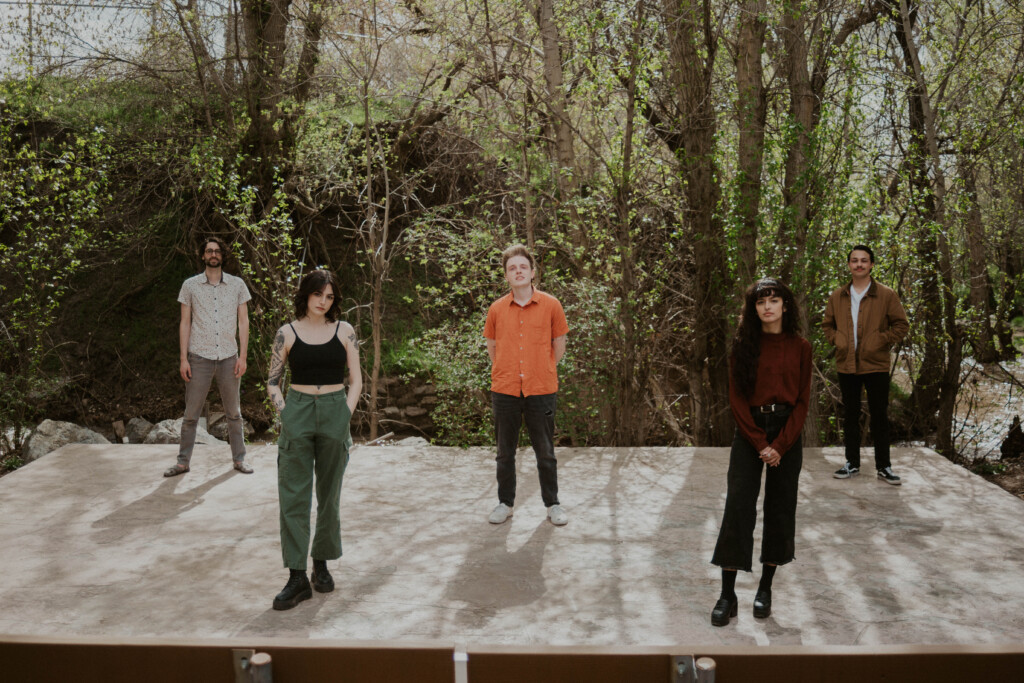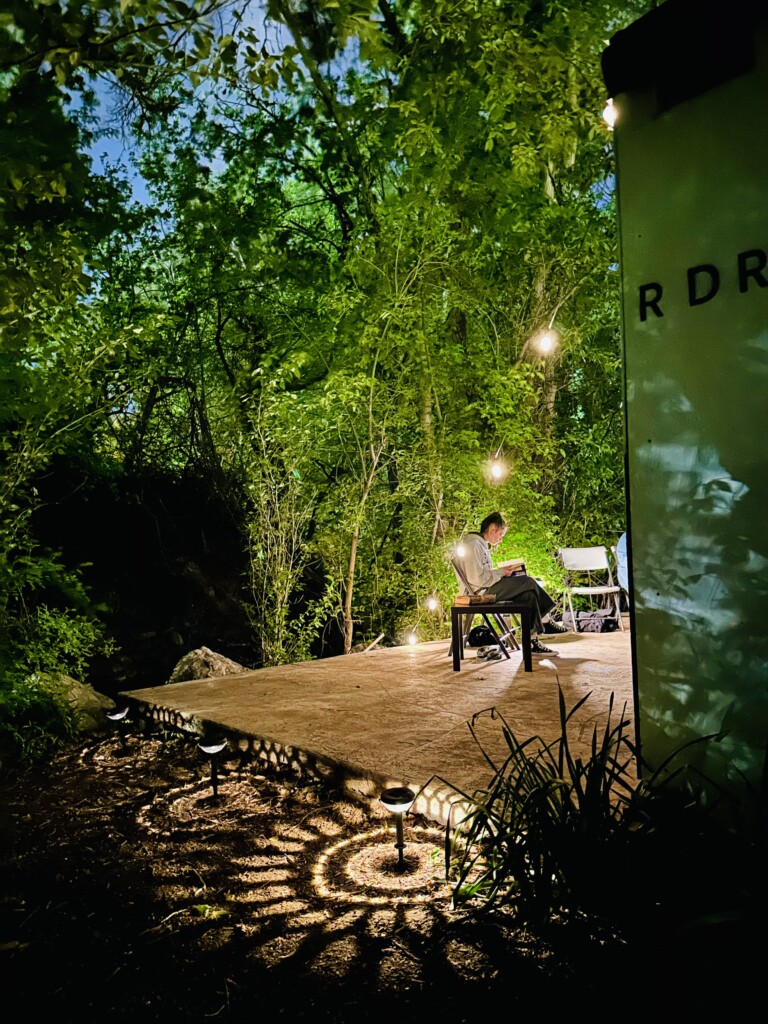Becoming more popular than its precursor “dream on,” the slangy derisive “in your dreams!” quickly took hold in the 1980s, making it painfully aware that despite desiring so much for something to happen, it will never be.
With eight miniature scenes by four Utah playwrights, presented to a tiny audience of six persons per performance, Sackerson’s In Your Dreams is a marvelous little theatrical tour of a derisive idiom, which bites with emotional, vulnerable realities that often hit much closer to home than we might anticipate.
Presented in partnership with Immigrant’s Daughter Theatre, this is Sackerson’s first production in more than three-and-a-half years but it is so refreshing to see one of Utah’s most imaginative theatrical outlets return to performances. In Your Dreams capitalizes on Sackerson’s finely honed talents for its logistical ingenuity in making site-specific immersive performances for individual theatergoers on an unprecedentedly intimate and microscopic scale. Since 2015, Sackerson has staked out an impressive position on the local theatrical scene.
For In Your Dreams, which is directed by Stephanie Stroud and co-directed by Morag Shepherd, the performances take place on Malmsten Amphitheater, located in a wooded area near the Dumke Field on the Westminster University, adjacent to Emigration Creek. In fact, the natural setting for the show provides a curiously palliative counterpoint to the show’s tableaux, which are presented in two small box sheds, while the six audience members are sitting in chairs (the area known as “The Hub”), as if they wait to enter one of the boxes. The sheds are tiny, which mean that when individual audience members enter for a tableau, the sensation of being so close to the actor usually can discomfiting, but for the right effect in capturing the show’s idiosyncratically brilliant creative brief.
The overall impact of In Your Dreams reminds of the fantastic 2019 Sackerson production A Brief Waltz in a Little Room: 23 Short Plays about Walter Eyer, which gave individuals a fast-moving tour of 23 short plays. Sackerson shows have a knack for generating a panoply of emotions – jarring, intimidating, vulnerable, humbling, empathetic, weirdly arousing, rueful, contemplative, puzzling and strangely uplifting and liberating.
The pace for In Your Dreams is more deliberate and relaxed, as individual audience members are rotated, again with the admirably well organized logistics that is part of Sackerson’s creative brand, to experience these eight plays, which are presented in four rounds.

In Your Dreams, Sackerson.
In the first round, audience members are invited to peruse a dream book that includes entries by audience members, which really spark musings when we try to interpret our dreams. Every round has a pair of songs, which audience members hear through headphones, listening to the one that introduces the next tableau. The music selections nail the context of the upcoming monologue performance, with clarity. Your Ex-Lover Is Dead by Stars takes the audience member to Matthew Ivan Bennett’s The Snake, where the actor recalls a mind-transforming dream about doing yard work when he discovers what he thinks is a long, fat snake but it turns out to be something entirely different. Meanwhile, Primadonna by Marina and the Diamonds is a spot-on intro to Ariana Farber’s HPD, where the actor, who portrays having symptoms of Histrionic Personality Disorder, invites a new clinical psychologist (the theatergoer) to take them on as a patient, with the hope of understanding the significance of dreams such as walking past three-dimensional sperm on a beach.
The second round includes a Hub artifact, where Bennett performs the audio monologue The Charks Are Coming, which he has written. Bennett, who has crafted an excellent sampling of work with dystopian themes and settings, rises to the standard in this piece. We hear the last recording of a doomed scientist, with taunts that sound like they are coming from primates and the pounding of walls which builds in volume. Human dominion of nature will never end well, despite our idealistic dreams.
For Shepherd’s Intimacy, audience members are primed with Ghost In The Machine by SZA (featuring Phoebe Bridgers), a perfect raw melancholic song about feeling hollowed out while our bodies are forced to exhaust themselves relentlessly to satisfy all sorts of demands. The monologue is appropriately anchored, as the audience member ia briefed before signing a contract for a procedure that should eradicate any issues or troubles with sexual intimacy. This is followed by Jesse Nepivoda’s The Procedure, aptly introduced by Free by Florence + The Machine, a song about music’s liberating virtues from the feeling of being overwhelmed. Here, we learn about a procedure to take all of our dreams from our heads, so that we can be free of any roadblocks and sleep without interruptions and do so peacefully.
The third round offers another Hub artifact for the waiting audience member to read: Nepivoda’s The Letter (Something Out There Is Waiting), which has been enclosed in a generic greeting card intended for expressing a message of condolence. It is the hopeful dream that the void, grief and tears will not endure forever because “something out there is waiting for us. Something better. Somewhere where there’s love. There’s hope in that.”
The derision of “in your dreams!” comes through loud and clear in Shepherd’s Plant, which is introduced by Radiohead’s Fake Plastic Trees. The actor plays a houseplant who is disheartened that his ‘wife’ might be cheating on him. The monologue encapsulates the gist of this Radiohead classic. While the ‘plant’ is the all-knowing storyteller, he sees through the façade but he also laments that he will always be stuck between staying with and separating from his companion. Dehydrated, the ‘plant’ dejectedly admits how the emotional drama has exhausted him.
Meanwhile, the audience member is a prospective Alcoholics Anonymous sponsor for the actor in Bennett’s If You Could Go Back, which has yet another superb song primer as the match: Bon Iver’s 33 God. The monologue parallels the song’s lyrics. capturing the paradoxical swings, rationales and excuses from the actor pitching their case to the audience member, who decides whether or not to become their sponsor.
The final round includes a delightful artifact: Farber’s The Texts (Call Me Back). The audience member receives a mobile phone text from Sam, a gay man who texts his best friend and imagines that he could be the ideal partner in a relationship, even if the other person is sending the vibe of “please keep dreaming.”

The last two plays nicely wrap the package of tableaux. Shepherd’s Stratford-Upon-Avon features an actor pleading for the audience member’s vote to stay in the Harry Potter Spotter Club. Likewise, the setup song, It Was Supposed To Be So Easy by The Streets, is about the frustration of throwing every imaginable effort into something that one has dreamed of, only to realize that it was a total waste,
Nepivoda’s Video Games riffs just as beautifully off Lana Del Rey’s song by the same title. The actor is despondent that this was not his dream life. Despite our best attempts to swoon and rhapsodize about our relationships, we eventually must accept how sometimes they are built on such fragile foundations that they inevitably will collapse.
Sackerson makes it seem so effortless but everything is persistently tweaked to calibrate the rotation with barely any dead time in between rounds. The actors switch up nicely and they tease out the creative demands from each of these pieces. That certainly was the case for a Saturday afternoon performance I attended, featuring actors Jordan Briggs, Juls Marino and Brynn Duncan. The other cast features Paul McGrew, Madazon Can-Can and Amona Faatau.
Shepherd serves as Sackerson’s artistic director and includes Nepivoda and Miranda Giles as producers. The show has extended its run through June 16. Tickets and performance dates are available here.


